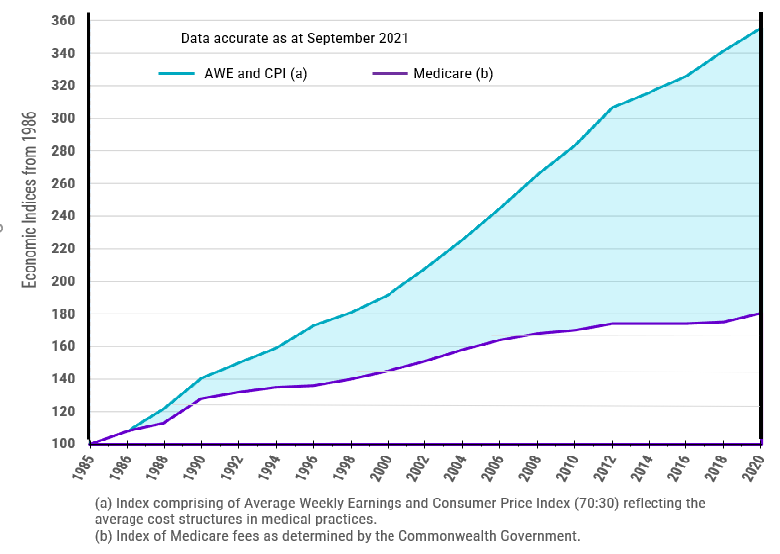Simply put, the amount that Medicare pays for each appointment no longer covers the basic costs of running a medical practice.
Our clinic has been providing quality health care to the Avalon community for the last 20+ years. There have been many challenges along the way, but none as difficult as the lack of funding for general practice perpetuated by successive governments. For the benefit of our low-income patients, our clinic has been absorbing this loss for many years, but this is no longer sustainable for the practice. This is now the case for many GP clinics across Australia.
Medicare is a rebate to the patient, not the doctor. Medicare is a public health insurance scheme. It provides rebates (support payments) to you when you access eligible health services, such as visiting your GP. These payments are yours, not your GP’s. ‘Bulk billing’ is when a doctor bills Medicare directly for the services provided to you, so you have no out-of-pocket expenses. If you are bulk billed, your doctor has accepted the rebate that Medicare pays for that service.
In most cases, the rebate you receive does not cover the total cost of the health service provided. That is why many bulk-billing clinics are going into receivership or closing. Bulk billing does not cover the cost of running a medical clinic. Most people are not aware that the gap between the minimum amount of payment recommended by the AMA and the Medicare rebate has widened over the years. Currently, the rebate for GP consultations is less than 50% of the fee that has been recommended by our nation’s medical associations. For example, in 2021 the AMA determined that $86 is the minimum amount that GPs should be charging for a 6 minute - 20-minute consultation. Medicare rebate to the patient for the same amount of time is $39.10.
Most GPs are independent contractors to a private clinic. They are not paid by the government.
Most GPs work on a % billing which can range from 45%-80% of the billings with most GPs earning 70% of the billings. This means that the medical practice receives 30% of the billings. Therefore, if you paid $100 for your consultation, then the GP will get $70 and will then be taxed on that amount. If the consultation is bulk billed between 6-20 minutes, the rebate is $39.10 and of that the GP will earn $27.37 (on 70% billings). This works out at $82.11 per hour if the GP has 20-minute consultations, on which the GP still must pay tax.
GPs are also not paid sick leave, holiday leave etc. Most doctors do other work for their patients outside the actual consultation for which they are not paid e.g., checking results, calling specialists, filling in paperwork etc. In addition, doctors must also pay thousands of dollars for medical insurance, AHPRA, RACGP, and ongoing training as well as spending their own time performing ongoing training. The practice has many expenses including staff, accreditation, rent, equipment maintenance and other medical incidentals.
As a comparison, in Australia, hourly rates for lawyers range from: Junior lawyer: $200 – $250 per hour. Senior lawyer: $250 – $400 per hour. Practice leader or partner: $400 – $600 per hour.
GPs working in our clinic have received additional training and education in areas of integrative and lifestyle medicine.
Please note that, in Australia, integrative and lifestyle GP consultations can command fees upwards of $600 per hour.
Before bulk-billing practices came into effect in the 1980’s, patients paid their doctor. People who were unable to afford to visit a doctor were means tested and they were able to access the hospital medical clinic. Doctors were paid the same way you pay for your lawyer, plumber, electrician, etc.
In the 1980’s when Medicare rebates were introduced, it was a little less than the AMA rate of what a doctor should have been paid. Conglomerates built medical centres and started bulk billing patients. GP’s forwent the small gap loss of income and put through larger volumes of patients to make up the shortfall. This meant that instead of patients having their own GP, they started going to any GP which has led to fragmented patient care for many patients.
The problem is that since that time, the Medicare rebate had only increased slightly, whereas the cost of living has increased significantly. Medicare rebates are now not in alignment with what a GP should be minimally paid (please see image below).
Your GP is the only health professional who knows your entire history. Think of a GP as a hub in a wheel and all the spokes are other specialists, allied health, community care, discharge summaries and follow up from hospital etc. These specialities communicate with your GP so that they can co-ordinate your entire healthcare and preventative care.
GPs working in our clinic have received additional training and education in areas of integrative and lifestyle medicine. This training requires huge commitment both in terms of cost and time involved but it does mean that our GPs are uniquely equipped to provide you with wholistic, integrative care.
